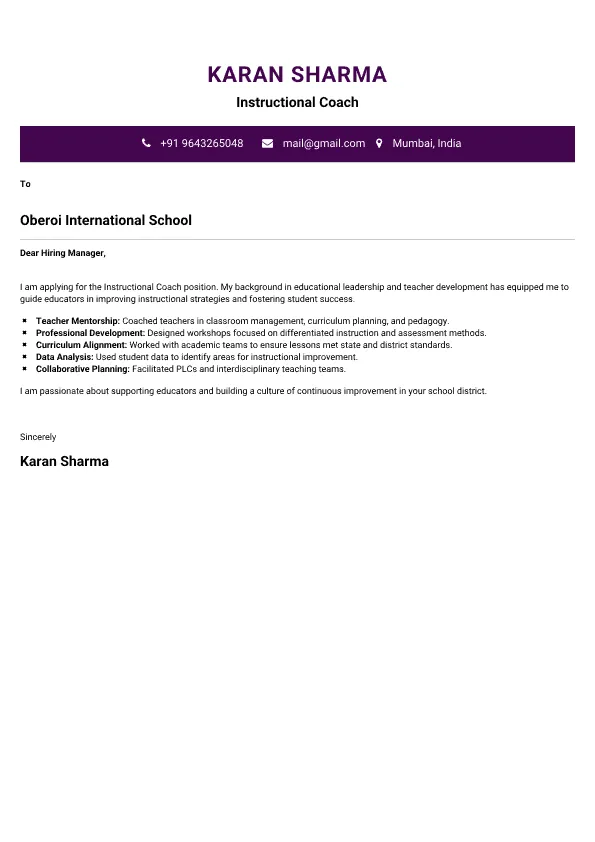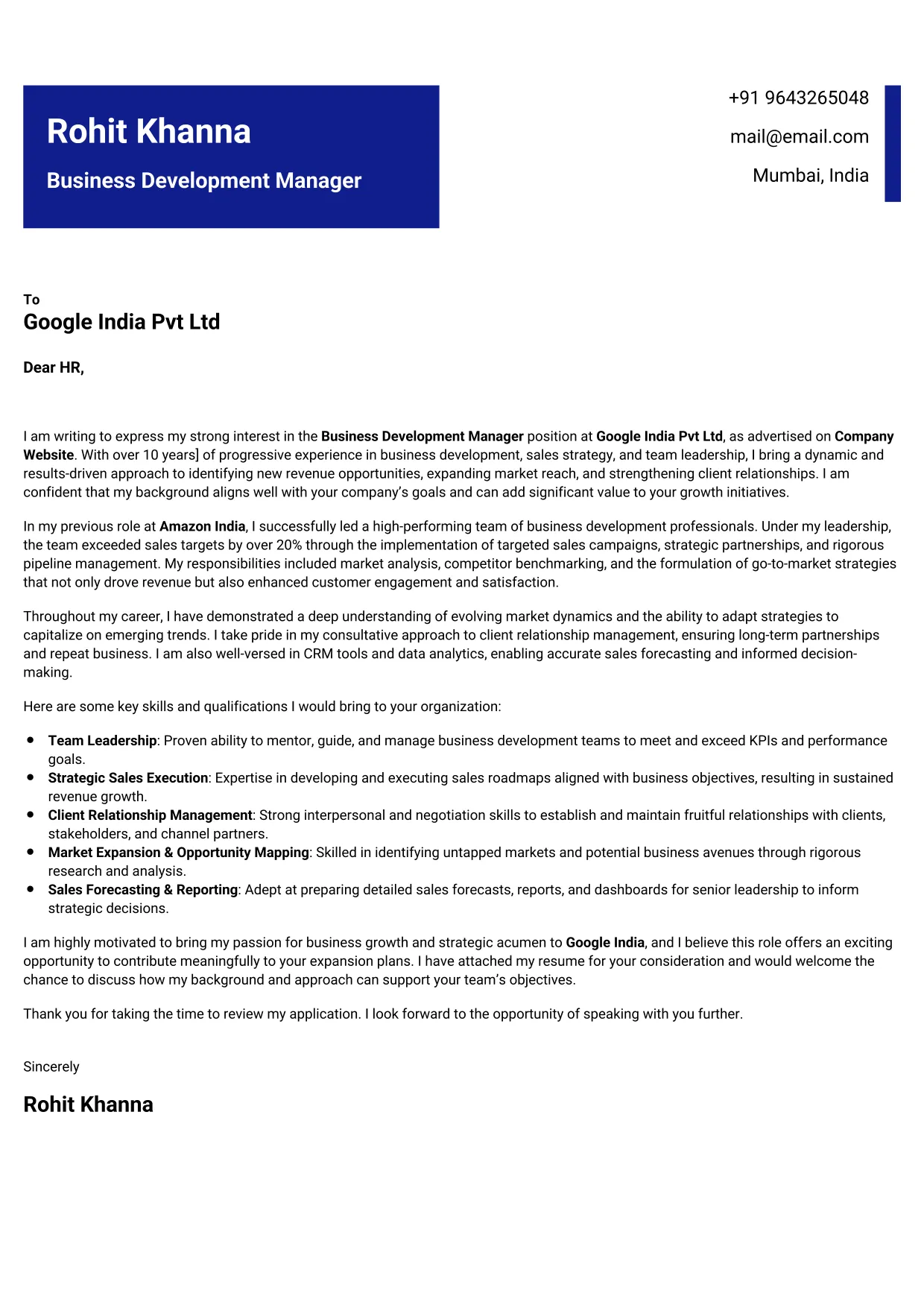Instructional Coach
Welcome to our Instructional Coach cover letter sample page! This professionally designed template is crafted to highlight your expertise in educational best practices, your proven ability to mentor and develop teachers, and your commitment to improving student outcomes through enhanced instruction. Whether you’re coaching in K-12, higher education, or corporate training environments, this sample emphasizes key skills like pedagogical strategies, curriculum integration, differentiated instruction, data analysis (student/teacher performance), professional development facilitation, and collaborative coaching. Tailored to meet 2025 employer expectations, this guide will help you create a compelling cover letter that stands out in the competitive education leadership field and secures your next impactful role.

How to Write a Cover Letter for an Instructional Coach
Address the Hiring Manager: Use the hiring manager’s name (e.g., “Dear Principal Green”) to personalize the letter and show attention to detail.
Highlight Relevant Experience: Focus on your experience with providing one-on-one coaching, facilitating professional development workshops, analyzing student and teacher data, developing instructional resources, and supporting curriculum implementation.
Quantify Achievements: Use metrics prominently, e.g., “Coached 15 teachers, resulting in a 10% average increase in student proficiency scores in their classrooms,” or “Led professional development series on differentiated instruction, improving teacher implementation rates by 25%.”
Incorporate Keywords: Include terms like “instructional coaching,” “teacher professional development,” “pedagogical strategies,” “curriculum implementation,” “differentiated instruction,” “data-driven instruction,” “classroom management (coaching),” “student achievement,” “formative assessment,” or “collaborative learning” from the job description to pass ATS filters.
Showcase Coaching Methodologies: Mention specific coaching models (e.g., Cognitive Coaching, Transformational Coaching) or frameworks that guide your practice.
Emphasize Communication & Relationship Building: Highlight your ability to build trust, provide constructive feedback, and foster a supportive coaching relationship with diverse educators.
Demonstrate Data Analysis & Action Planning: Include examples of how you used student or teacher performance data to identify needs, set goals, and create actionable plans.
Keep It Concise: Limit the cover letter to one page, focusing on your most impactful contributions to instructional improvement.
Close with Enthusiasm: End with a strong call to action, e.g., “I am eager to contribute my instructional coaching expertise to [School/District Name]'s commitment to fostering a culture of continuous learning and excellence.”
Data Literacy for Teachers: Showcase expertise in coaching teachers to effectively collect, analyze, and use student data to inform their instructional practices and differentiate learning.
SEL (Social-Emotional Learning) Integration: Strong emphasis on coaching teachers to embed SEL competencies into their curriculum and classroom management for holistic student development.
Equity-Focused Coaching: Highlight strategies for coaching teachers to implement culturally responsive pedagogy, address achievement gaps, and ensure equitable outcomes for all students.
Technology Integration Coaching: Expertise in coaching teachers to effectively integrate educational technology (LMS, adaptive learning tools, virtual labs) into their lessons to enhance engagement and learning.
Teacher Retention & Well-being Support: Mention how your coaching contributes to teacher efficacy, reduces burnout, and supports overall teacher well-being.
Curriculum Alignment (Standards-Based): Focus on your ability to coach teachers on aligning their instruction with state standards and curriculum frameworks.
Formative Assessment Strategies: Emphasize coaching teachers on implementing effective formative assessment practices to guide instruction and provide timely feedback to students.
Choose Superbresume.com to craft an Instructional Coach cover letter that truly develops careers. Our platform offers tailored templates optimized for ATS, ensuring your expertise in pedagogical strategies, teacher development, and student achievement shines. With expert guidance, pre-written content, and real-time feedback, we help you highlight achievements like improving student outcomes, increasing teacher effectiveness, or leading impactful professional development. Whether you’re transforming classrooms or enhancing school-wide instruction, our tools make it easy to create a polished, results-driven cover letter. Trust Superbresume.com to showcase your indispensable skills and secure interviews for pivotal educational leadership roles.
20 Key Skills for an Instructional Coach Cover Letter
| Pedagogical Strategies | Teacher Professional Development |
| Curriculum Implementation & Integration | Differentiated Instruction |
| Data Analysis (Student/Teacher Performance) | Coaching Models (e.g., Cognitive Coaching) |
| Classroom Observation & Feedback | Student Engagement Strategies |
| Communication (Constructive Feedback) | Relationship Building (Teacher) |
| Adult Learning Principles | Problem-Solving (Instructional Challenges) |
| Lesson Planning (Review/Support) | Formative & Summative Assessment |
| Technology Integration (EdTech) | Learning Management Systems (LMS) |
| Collaboration (Interdepartmental) | Leadership (Non-Evaluative) |
| Active Listening | Change Management (Education) |
10 Do’s for an Instructional Coach Cover Letter
Lead with Teacher Development
Highlight Coaching Methodology
Quantify Achievements
Showcase Data-Driven Approach
Include Collaborative Skills
Optimize for ATS
Keep It Professional & Supportive
Mention Technology Integration
Proofread Meticulously
10 Don’ts for an Instructional Coach Cover Letter
Don’t Be Vague About Coaching Impact
Don’t Exceed One Page
Don’t Skip Relationship Building
Don’t Use Complex Formats
Don’t Omit Data-Driven Decision-Making
Don’t Focus Only on Your Own Teaching
Don’t Ignore Adult Learning Principles
Don’t Include Irrelevant Experience
Don’t Forget to Update
5 FAQs for an Instructional Coach Cover Letter
Prioritize pedagogical strategies, teacher professional development, data analysis (student/teacher), coaching methodologies, and collaborative communication.
Use standard formatting, avoid graphics, and include keywords like “teacher leader,” “instructional leadership,” “professional learning communities (PLCs),” and specific curriculum/assessment terms from the job description.
Yes, absolutely. Strong classroom experience is foundational for an instructional coach; briefly highlight your success as a teacher.
Describe your approach to conducting classroom observations, providing specific and actionable feedback, and then supporting teachers in implementing new strategies, emphasizing a non-evaluative and growth-oriented mindset.
Use a professional, supportive, collaborative, and knowledgeable tone, conveying your dedication to empowering teachers and enhancing student learning outcomes.
Get 5x more interviews with our crafted Resumes. We make Cover Letter that land jobs.

Free Customized Cover Letter + Expert Resume Advice
Receive a professionally tailored cover letter absolutely free with every resume order—plus expert guidance to make your resume stand out.
